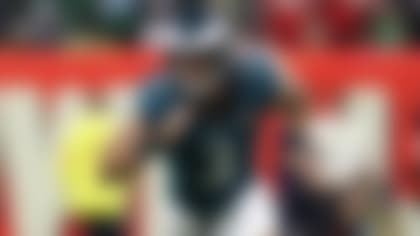The images of people huddled around Junior Seau's home on Wednesday -- grieving, crying and trying to make sense of a life gone all too soon -- sent shivers up my spine. That's when the reality sunk in, the sad finality of it all truly registered.
Seau's passing, allegedly at his own hands, rocked the entire NFL. The San Diego County medical examiner's office ruled his death a suicide on Thursday. To many, it seems incomprehensible. For me, it's heartbreakingly reminiscent of what's become an all-too-common scene, flashing back to the Fourth of July, 2009, with Steve McNair killed, and the Thanksgiving season of 2007, when Sean Taylor was murdered. Immediately, similarities to Dave Duerson's suicide rushed to the fore. It's difficult not to connect the morbid dots or start to see patterns before we absolutely know they are there.
Darlington: Stories define Seau
More than anything, Junior Seau will be remembered for the fun, impactful stories he leaves behind, Jeff Darlington writes. **More ...**
In the coming weeks, I'm sure we'll learn more about Seau's final days, and if in fact he did take his own life, what inner torment he lived with. Perhaps, in time, if he was suffering from depression or brain damage, we can only hope that more is learned about any potential links between head injuries and these issues. For someone who burned so bright, emanated such positivity and made the lives of those around him so much better, we can only hope and pray that there is some positive result to come from this.
But what we do know is that in Seau's 43 years -- much of it spent on a football field -- he was a beacon of joy. He lived fully and passionately. He gave to others far more than he took. He embraced everything that came with being a star athlete. He relished the platform to help those less fortunate and embodied the spirit of charity. He didn't have to try to be a role model -- it was the only way he knew how to live.
He was to San Diego what Cal Ripken Jr. is to Baltimore -- a true hometown hero synonymous with where he lived and inseparable from the community. He reveled in it. Seau, like Ripken, was a source of civic pride through his play on the field and all his good deeds. The can't-miss kid who seemingly never did.
He inspired teammates with a full-speed approach to the game. He willed his teams to victories, with the 1992 San Diego Chargers becoming the first team to reach the postseason despite an 0-4 start, and guided the franchise to an improbable trip to the Super Bowl in 1994. He was a tackling machine who shuttled from sideline to sideline. He was selfless. He always did the right thing. (Remember the locker room clip of troubled No. 2 pick Ryan Leaf about to throttle a reporter for some imaginary slight? It was Seau who swooped in and diffused the situation. There he was again, always helping others.)
Seau was a national icon who never forgot where he came from -- Oceanside, Calif., in San Diego County, near Marine Corps Base Camp Pendleton. Like Ripken, he was the quintessential professional, a tireless worker who would grind away daily on the fundamentals of his craft, no detail to small. He was an Iron Man, too, in his own right, lasting 20 years at linebacker, always playing at breakneck speed with reckless disregard for his body, trusting his finely honed football instincts. Even when his teams didn't win, he was a winner.
Peers wanted to play with him and feared playing against him. At Pro Bowls -- he went to 12 straight -- he was an alpha male among alpha males, someone whom others admired and respected just for being the person and player he was.
"To me, Junior had a quality of making the people around him feel special and comfortable," Peyton Manning said in a statement in which he called Seau and Ray Lewis the best linebackers he has ever faced. "It didn't matter what environment he was in -- he had just a great energy and an aura about him that people gravitated to. That's why he was such a great leader. I always felt good being around him."
Seau made wearing No. 55 at USC a special tradition for linebackers, which had NFL Network's Willie McGinest choked up on air Wednesday, speaking about having that number passed down to him as a Trojan, and then ultimately passing it back to Seau in New England. He was a beacon to young athletes throughout Southern California, and a legend among a growing legion of Samoan stars.
Rapoport: Seau everyone's buddy
In the twilight of his career, Junior Seau left quite an impression on the New England Patriots, Ian Rapoport writes. **More ...**
"Junior Seau meant so much to me and many other Samoan youth both as a player and a person," Steelers safety Troy Polamalu tweeted. "Junior epitomized hard work and dedication to football and philanthropy. He was a childhood hero of mine, and honored to say, a good friend. Junior Seau will always be someone I look up to and will walk the path he paved for me and many other Trojans, Samoans and athletes alike."
There was a reason why, when Jim Harbaugh played his last football game (as a Charger), he was overwhelmed with the urge to trade jerseys with Seau, the ultimate Charger, after the game -- something he had never done before in his career.
"One of my fondest remembrances as a professional football player," Harbaugh, now the San Francisco 49ers head coach, said in a statement released by the team, "was looking across the locker room after playing my last career game with the Chargers and knowing that I had shared that moment with one of the greatest teammates and competitors the game has ever known."
Seau was born to play football. His excitement and enthusiasm exuded on the field down to his very last tackle, at age 40, after being coaxed back to the field from his new life in television to continue his Hall of Fame career by Bill Belichick.
But even as he migrated to the Miami Dolphins and then the New England Patriots over the final seven years of his illustrious career, his heart was always in San Diego.
That was always home.
You'd find Seau at his restaurant or riding waves at the beach. He'd always keep an eye on the Trojans and Chargers. San Diego is where he felt most comfortable. The only place for him to live, and, so sadly, the place where he would die.
That he did so -- so suddenly, so soon -- stings the most. The man who was always there for everyone else is gone, with seemingly no one knowing the inner pain that he masked. "I am saddened that I was not there for Junior," Harbaugh said, "as he had always been for his teammates and friends."
With his passing, the fraternity of NFL players grows even closer. He leaves behind a weeping city, a devastated franchise and so many questions that we hope can someday be answered about the man, and the effects of the game he played so well.
Follow Jason La Canfora on Twitter @JasonLaCanfora



